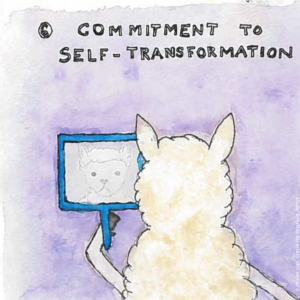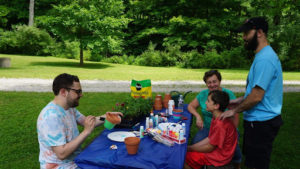At the Center for Coalfield Justice, we are rooted in our communities here in Washington and Greene Counties. We take a bottom-up approach to our work, meaning the Center for Coalfield Justice follows the direction of our members, not vice versa. There is no place quite like the lush rolling hills of Southwestern Pennsylvania, and likewise, our challenges and solutions are also unique to our community. The history of these counties has been rooted in rebellion and resistance to “the powers that be’’ – just look at the Whiskey Rebellion of the 1790s and union organizing of the early 20th century. CCJ has rooted in that same spirit, that this community knows its needs better than any outsider, and only we can be the ones to take on those challenges.
Environmental Justice – Beyond Environmental Protection
Furthermore, our mission is rooted in the principle of environmental justice. Environmental justice means that all people and communities – no matter their privilege in our society – have the right to a clean and healthy environment. It is impossible to untangle the deeply intertwined issues in this country such as class and race from environmental harms. For example, a report from the NAACP found that the residents living near coal plants were disproportionately poor and people of color, and therefore have the greatest adverse health effects from the associated pollution.
Southwestern Pennsylvania is home to multiple extractive industries, including the largest producing underground coal mine in North America as well as over 3,600 fracked gas drilling and midstream operations. As we advocate for clean and healthy streams and better economic opportunities in Greene County, this is not disconnected from our partners advocating for fair wages in Pittsburgh or better rural healthcare in West Virginia.
—–
The below Principles of Environmental Justice were drafted and adopted in 1991 at the National People of Color Environmental Leadership Summit, and serve as a guidepost for the movement. Here are the 17 principles, reprinted in full from the Environmental Justice Resource Center’s site:
Principles of Environmental Justice
Preamble WE THE PEOPLE OF COLOR, gathered together at this multinational People of Color Environmental Leadership Summit, to begin to build a national and international movement of all peoples of color to fight the destruction and taking of our lands and communities, do hereby re-establish our spiritual interdependence to the sacredness of our Mother Earth; to respect and celebrate each of our cultures, languages and beliefs about the natural world and our roles in healing ourselves; to insure environmental justice; to promote economic alternatives which would contribute to the development of environmentally safe livelihoods; and, to secure our political, economic and cultural liberation that has been denied for over 500 years of colonization and oppression, resulting in the poisoning of our communities and land and the genocide of our peoples, do affirm and adopt these Principles of Environmental Justice:
- Environmental justice affirms the sacredness of Mother Earth, ecological unity and the interdependence of all species, and the right to be free from ecological destruction.
- Environmental justice demands that public policy be based on mutual respect and justice for all peoples, free from any form of discrimination or bias.
- Environmental justice mandates the right to ethical, balanced and responsible uses of land and renewable resources in the interest of a sustainable planet for humans and other living things.
- Environmental justice calls for universal protection from nuclear testing, extraction, production and disposal of toxic/hazardous wastes and poisons and nuclear testing that threaten the fundamental right to clean air, land, water, and food.
- Environmental justice affirms the fundamental right to political, economic, cultural and environmental self-determination of all peoples.
- Environmental justice demands the cessation of the production of all toxins, hazardous wastes, and radioactive materials, and that all past and current producers be held strictly accountable to the people for detoxification and the containment at the point of production.
- Environmental justice demands the right to participate as equal partners at every level of decision-making including needs assessment, planning, implementation, enforcement and evaluation.
- Environmental justice affirms the right of all workers to a safe and healthy work environment, without being forced to choose between an unsafe livelihood and unemployment. It also affirms the right of those who work at home to be free from environmental hazards.
- Environmental justice protects the right of victims of environmental injustice to receive full compensation and reparations for damages as well as quality health care.
- Environmental justice considers governmental acts of environmental injustice a violation of international law, the Universal Declaration On Human Rights, and the United Nations Convention on Genocide.
- Environmental justice must recognize a special legal and natural relationship of Native Peoples to the U.S. government through treaties, agreements, compacts, and covenants affirming sovereignty and self-determination.
- Environmental justice affirms the need for urban and rural ecological policies to clean up and rebuild our cities and rural areas in balance with nature, honoring the cultural integrity of all our communities, and providing fair access for all to the full range of resources.
- Environmental justice calls for the strict enforcement of principles of informed consent, and a halt to the testing of experimental reproductive and medical procedures and vaccinations on people of color.
- Environmental justice opposes the destructive operations of multinational corporations.
- Environmental justice opposes military occupation, repression and exploitation of lands, peoples and cultures, and other life forms.
- Environmental justice calls for the education of present and future generations which emphasizes social and environmental issues, based on our experience and an appreciation of our diverse cultural perspectives.
- Environmental justice requires that we, as individuals, make personal and consumer choices to consume as little of Mother Earth’s resources and to produce as little waste as possible; and make the conscious decision to challenge and reprioritize our lifestyles to insure the health of the natural world for present and future generations.
Adopted today, October 27, 1991, in Washington, D.C.
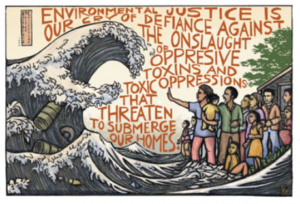
We believe that no one is liberated until we all are, and if we join together for collective liberation, we have the power to shape our community to be a safe, healthy, and thriving place for all to enjoy.
The Jemez Principles
A framework of community organizing that we use is called the “Jemez Principles”. These principles were created in 1996 by forty people of color and European-American representatives at the Southwest Network for Environmental and Economic Justice (SNEEJ) in Jemez, New Mexico.
The Jemez Principles are a foundation for the way we structure our organizing at the Center for Coalfield Justice. They are based on values of community, relationships, and self-efficacy. Simply put, we can only move forward by all of us coming together, treating each other and ourselves with love and respect, and by valuing everyone’s own experiences and voices. These principles are grounded in transformation, not transaction: In order to create transformative change for our community, we must also transform ourselves, our visions, and our structures so that we can follow these principles.
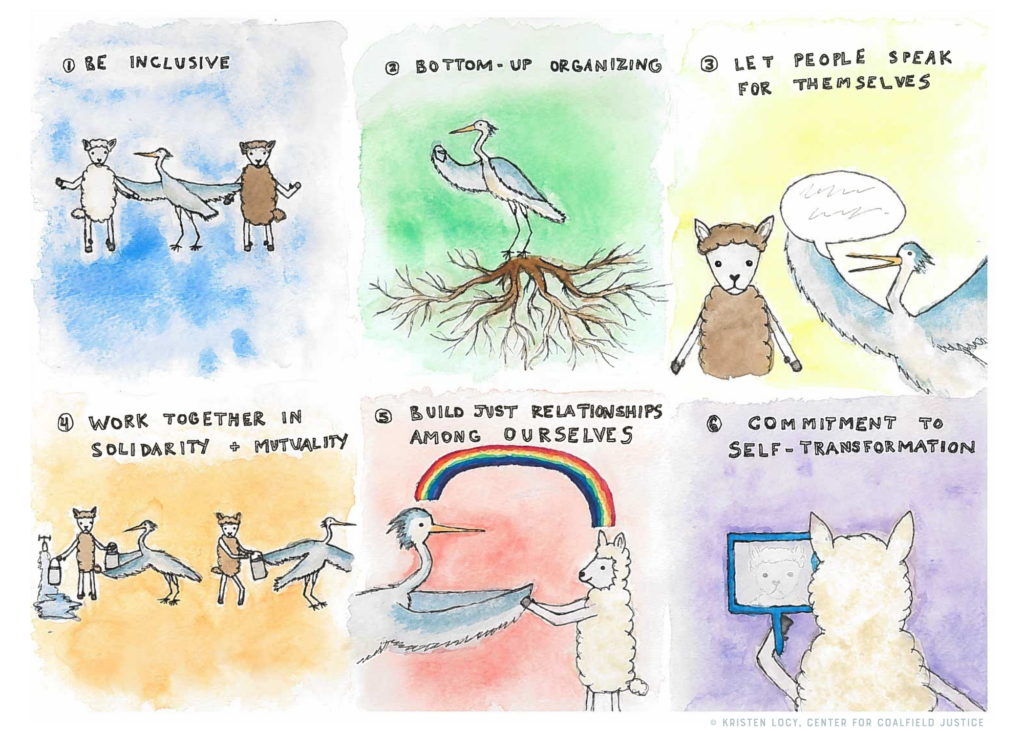
1. Be Inclusive
CCJ aims to be a welcoming space for all people and all voices. We recognize that the dominant narratives come from a majority white cultural background, and we welcome voices of all backgrounds. We have a community meeting space that is handicapped accessible and welcome all members of the community to join us for our regular monthly meetings. We also try to communicate to our members in a variety of formats for people of different backgrounds including texts, emails, calls, letters, in-person meetings, virtual meetings, etc. If you have any issues with accessibility, please contact us.
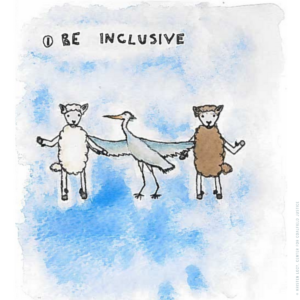
2. Emphasis on bottom-up organizing
As mentioned above, a pillar of bottom-up or “grassroots” organizing is that we as a community know our experience and needs better than anyone from the outside. We look to our members and community to guide our campaigns and projects. Monthly community meetings allow our members to discuss their needs and desires. Our staff are also reachable and are in close contact with many of our active members. Additionally, the majority of our staff is not from outside the community but are lifelong community members themselves. Our office is based in the heart of Washington.
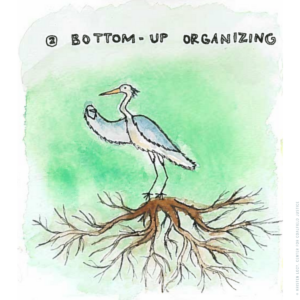
3. Let people speak for themselves
We make a commitment to listen to our members and have our members listen to each other. We believe everyone brings their unique experience and knowledge to the table, and everyone is equally valued. We will not speak on behalf of anyone unless asked to. We must be sure that the relevant voices of those directly affected are heard. We offer support to those who want to make their voices heard in public settings.

4. Work in solidarity and mutuality
We are stronger working together than apart. We also collaborate with other groups with similar goals, such as the Mountain Watershed Association, Buffalo Creek Watershed Association, Protect PT, and more. In addition, we are members of various coalitions, such as the Alliance for Appalachia, People Over Petro Coalition, the PA Climate Equity Table, and Break Free From Plastic. You can read more about our partnerships here. Finally, we work with other community groups such as local labor unions, volunteer organizations, faith groups, and government leaders.
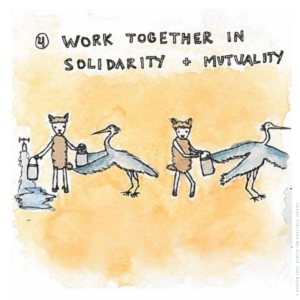
5. Build just relationships among ourselves
We need to treat each other with justice and respect, both on an individual and an organizational level, in this country and across borders. We know that the issues we work on are very sensitive for many people, and it is our deeply held value that we work to support people who are experiencing harm – regardless of whether they work for an energy company or were excited to sign a gas lease, and regardless of whether they are CCJ members or not. Furthermore, our organization is built on a strong basis of teamwork and mutuality within the organization. We believe in building strong relationships among our staff and treating them with support and respect to fulfill their jobs in the best way possible. We know that strong relationships are the foundation of the world we want to live in, so we do our best to model that in our structure and actions.
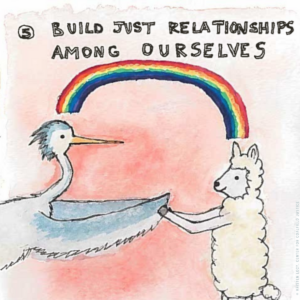
6. Commitment to self-transformation
Throughout our lives, we have assimilated and learned the assumptions, rules, roles, and structures that were in place before we were born, but we must unlearn these power structures in our everyday actions and organizations. We must live the values that we say we’re aiming for such as peace, justice, and community-centeredness. Our staff aims for this, and we try to provide the support for our members to do the same. In order to transform society, we must first transform ourselves.
